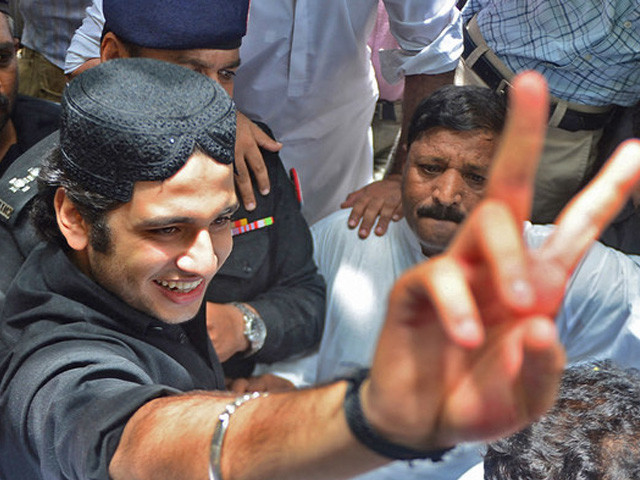Shahrukh Jatoi, the main accused in the Shahzeb Khan murder case, has been acquitted by the apex court, along with the other convicts. This major development in the high profile case has been condemned and criticised all over social media.
Khan, a 20-year-old youngster, was shot dead on the night of December 24th, 2012, after he demanded an apology from the accused, whose employee had harassed Khan’s sister. Despite the matter being settled, the accused chased the victim and gunned him down in cold blood. The matter was brought to light after which the accused, the son of an affluent landlord in Sindh, was arrested due to immense pressure from the public. However, in 2013, death penalty was awarded to Jatoi, and his friend Siraj Talpur, by the anti-terrorism court, while the other convicts were awarded with lifetime imprisonment. The parents of the deceased, however, pardoned the convicts accused of murdering their only son, but due to the terrorism charges against the accused, the capital punishment had been upheld despite the pardon.
The accused, however, were released on bail by the sessions court which had sparked anger and insecurity amongst the civil society. The sessions court’s order was challenged by the civil society and activists which led to a suo moto of the petition by the Supreme Court and eventually the order of bail was nullified. However, the death sentence was commuted to life imprisonment in 2019.
Ten years later, eventually the Supreme Court has set all the convicts free after the convicts approached the SC for the acquittal on the basis of pardon granted by the family of the deceased.
This murder case was a test case for the judiciary and the state to see whether those who are influential in this country can be brought to justice for the crimes they commit or can they get away with anything they do, unscathed. Unfortunately, the latter reflects the bitter reality of a country where the Diyat law comes as a saviour of the affluent. The provision of Diyat law – also termed as “blood money” and was introduced in Pakistan’s legal system about 32 years ago, on the order of the Shariat Appellate Bench of the Supreme Court of Pakistan. The law allows the heirs or family of the victim to forgive the murderer either after receiving blood money as compensation under section 310 of Pakistan Penal Code (PPC) or without any compensation, in the name of God, under section 309.
The justice system of the state is largely undermined when power is granted to the heirs to pardon the murderers. This law presents a lacuna in our legal system which has time and again been manipulated by the powerful to get away with a crime as heinous as a murder.
Raymond Davis, an American national, was acquitted despite being charged with the murder of two Pakistanis, after reaching an agreement with the families of the victims. The brother of the feminist activist and social media model Qandeel Baloch, was also acquitted of the charge after the parents of the victim pardoned their son for murdering his own sister in the name of honour. Earlier this year, the accused in the Nazim Jokhio murder case, including the Pakistan Peoples Party (PPP) MPA Jam Awais and MNA Jam Karim, were pardoned by the widow of the victim who asserted that “justice can’t be served in Pakistan” and left the matter in hands of God.
The acquittal of Jatoi, in the same vein, is indicative of the fact that justice is not served but bought; bought by those who have power, money, and influence.
The Diyat law undermines the criminal law which deals with the violation of rights of the public and holds the state responsible for penalising the perpetrators. The acquittal of Jatoi and other convicts not only reflects the failure of our justice system but also of the state’s writ. In order to maintain order in the society, it is essential for the state to punish the one who takes away the right to life of another human. Murder is not a crime against an individual but the public at large – as it leaves the society insecure and vulnerable. It’s a crime against the state – the entity created in the first place to provide security to the individuals.
Jatoi’s acquittal has left the majority in a state of fear – the fear of being a few bullets away from being killed at the hands of an affluent who would then conveniently coerce the family into granting a pardon, in return of a compensation, or in the name of God, and would escape the charge, roam freely, and make a victory sign – as he should since victorious is the one who has the power to turn circumstances in his favour.
However, in the latest development, the state has decided to file a review petition against the acquittal of Jatoi. The petition by the Attorney-General for Pakistan (AGP) on behest of the state has sought the review of the verdict keeping in view the components of compromise and mischief. The review petition is a significant move made by the state as it’s the responsibility and the foundational purpose of the state to enable its citizens to feel secure and penalise the offender who infringed upon the rights of individuals.
Nevertheless, the onus falls upon the state to amend the Diyat law thus preventing the powerful from manipulating it to get off scot-free and ensure the penalty of anyone who commits a murder, irrespective of their social status. Murder needs to be dealt as a test of state’s writ. If not, the state will become anarchic, which would lead to a state of nature, leaving all individuals insecure and susceptible to meeting the same fate as Qandeel, Nazim or Shahzeb.



COMMENTS
Comments are moderated and generally will be posted if they are on-topic and not abusive.
For more information, please see our Comments FAQ